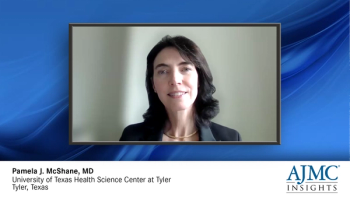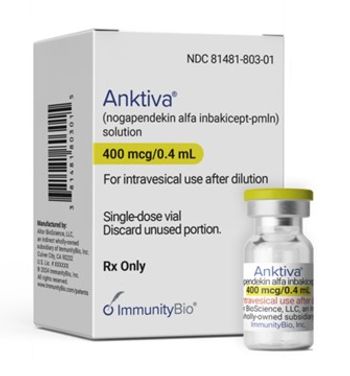Clinical
Latest News

Latest Videos
CME Content
More News

The study provides evidence of survival benefits among patients with Duchenne muscular dystrophy (DMD) receiving eteplirsen compared with the natural history of the condition.

JAMA used a case report of rhino-orbital-cerebral mucormycosis in a patient with uncontrolled diabetes to demonstrate correct and incorrect treatment choices.

Self-reported data from adult and pediatric males with hemophilia A show that burden of the disease persists regardless of severity, highlighting a need for improved prophylactic treatment.

While the Dynamic International Prognostic Scoring System and bone marrow blasts may predict overall survival, the lack of certain mutations is also associated with a better prognosis for myeloproliferative neoplasm, unclassifiable (MPN-U).

What We’re Reading: FDA Approves UTI Antibiotic; Ozempic, Wegovy Price Investigation; US Births Fall
The FDA recently approved an antibiotic for the treatment of urinary tract infections (UTIs) in women; a Senate committee recently launched an investigation into the prices of Novo Nordisk’s diabetes and weight loss drugs; US births fell last year, resuming a national slide after a previous increase during the pandemic.

Amit Singal, MD, medical director of the UT Southwestern Medical Center Liver Tumor Program, discusses populations at the highest risk of hepatocellular carcinoma (HCC), when screening is needed, and key tools in HCC surveillance and screening.

In a retrospective study, the machine learning tool was able to screen for potential risks of cardiovascular disease nearly 60 days before the patient's medical record showed any signs of a related condition or before they were officially diagnosed or treated for it.


New guidance on managing desmoid fibromatosis recommends a more conservative approach, encompassing the patient perspective, active surveillance, tumor location, and risk-benefit assessment.

For patients with early-stage non–small cell lung cancer (NSCLC), combining neoadjuvant immune checkpoint inhibitors and platinum-based chemotherapy improves 2-year outcomes over chemotherapy alone, suggest findings of an extensive literature review and meta-analysis.

Downward Morbidity, Mortality Trends Discovered Among Patients With Ovarian Cancer, Liver Metastases
This study indicates a declining trend in morbidity and mortality rates among patients with ovarian cancer and liver metastases, highlighting the efficacy of surgery and chemotherapy in improving survival outcomes.

Population pharmacokinetic and exposure-response analyses revealed a favorable benefit-risk profilane for the treatment combination of polatuzumab vedotin and rituximab, cyclophosphamide, doxorubicin, and prednisone (R-CHP).

Pamela J. McShane, MD, explains her approach to diagnosing the underlying cause of bronchiectasis, which includes identifying cystic fibrosis in older patients, and emphasizes the importance of helping patients lead a normal life while managing their condition.

Diabetes treatment goals vary based on age and diabetes type, with more focus on managing insulin levels for children and adolescents while addressing comorbid conditions like obesity and hypertension for adults, said Beau Raymond, MD, MMM, FACP, of Ochsner Health Network.

Patients with chronic obstructive pulmonary disease (COPD) and muscle loss phenotype (MLP) have an elevated risk of all-cause or COPD-related mortality.

EVIdeNCE study data, from real-world practice, confirm the efficacy and safety that ibrutinib previously demonstrated in clinical trials involving patients with CLL, according to the study authors.

The principal investigator of the study leading to approval said this new immunotherapy could be a "game changer" in bladder cancer.

Research indicated that worsened glycemic, blood pressure, and obesity control, as well as increased alcohol consumption, leveled lipid control, and persistent socioeconomic disparities may have contributed to the decelerated cardiovascular mortality decline in recent years.

Experts give their concluding thoughts on cardiovascular care and closing disparity gaps to optimize patient outcomes.

Efficacy results support long-term use of risankizumab in patients with active psoriatic arthritis across multiple patient and psoriatic disease characteristics.

Study findings demonstrate the pivotal role of patient-reported outcomes in identifying frailty among individuals experiencing acute exacerbations of chronic obstructive pulmonary disease (COPD).

Significant improvements were seen in ventilation heterogeneity in patients with severe asthma after 12 months of bronchial thermoplasty.

A tumor board looked to studies in ovarian cancer for guidance on use of immunotherapy in a rare case of clear cell carcinoma of the cervix.

Only 11 cases of adverse events (AEs) were reported over a 6-year time frame, the investigators found, following administration of chimeric antigen receptor T-cell therapy (CAR T).

Non-Hispanic Black (NHB) patients with ovarian cancer (OC) receive lower-quality end of life (EOL) care compared to their non-Hispanic White (NHW) counterparts, according to a study.















